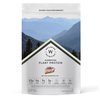Tell us what you eat, and we’ll tell you who you are. You are more likely to have an inactive lifestyle if your diet is high in simple sweets, processed foods, and fats. You typically feel lethargic, and you don't feel eager to start your day until you have coffee in your stomach. On the contrary, if you eat a light but well-balanced diet that includes plenty of fruits and vegetables, you will be energized throughout the day.
You might think of it as a joke, but it isn’t. A study conducted in 2012 with a sample of 20,000 workers found that people who rarely eat fruits, veggies, and low-fat food are 93% more likely to have a loss of productivity. What you eat and the way you live your life impact your cognitive abilities, mood, energy, and motivation to work or study.
The Diet-Productivity Connection
The nutrients and bioactive compounds present in our diet play a crucial role in modulating brain function, neurotransmitter balance, energy metabolism, inflammatory responses, and gut-brain communication.
-
Neurotransmitter balance:
Neurotransmitters are chemical messengers that regulate communication between brain cells. For instance, the amino acid tryptophan found in protein-rich foods is a precursor to serotonin. Consuming an adequate amount of tryptophan-containing foods helps support serotonin production, which can positively impact productivity and your overall mental state.
-
Glucose regulation:
Glucose, derived from carbohydrates, is the primary source of energy for the brain. A diet consisting of complex carbohydrates with a low glycemic index (GI) leads to a gradual release of glucose into the bloodstream, providing a steady supply of fuel for the brain. This helps maintain stable energy levels and sustain productivity throughout the day. Conversely, consuming high-GI foods, such as sugary snacks or refined grains, can cause rapid blood sugar spikes followed by crashes, leading to decreased energy and reduced focus.
-
Gut-brain axis:
The gut and brain communicate through a pathway called the gut-brain axis. A healthy and diverse gut microbiome, influenced by diet, produces neurotransmitters, vitamins, and short-chain fatty acids that impact brain function.
-
Nutrient deficiencies:
Inadequate intake of essential nutrients can lead to deficiencies that impact brain function and productivity. For example, insufficient intake of B vitamins (such as B12 and folate) can impair cognitive function, while iron deficiency can lead to fatigue and reduced mental clarity.
If you have been trying to check things off your to-do list but are failing despite continuous efforts, this list of food items to boost productivity will help you. Adding these foods to your daily diet will help you keep your mind active and your energy levels high.
6 Nutrients & Foods to Help Boost Productivity
1. Protein
Neurotransmitters are chemical messengers that carry messages from your brain to other parts of the body. Without efficient transmission of these messages, you cannot carry out even basic tasks like using your finger to scroll up. Protein gives your body the necessary amino acids, which are the building blocks of these chemical communications.
Moreover, protein also provides you with sustained energy to stay active all day long.
Proteins are of two types: complete and incomplete. Complete proteins are the ones that provide you with all nine amino acids. These are mostly found in animal-based food items like meat, eggs, and milk. Some plant-based sources of complete protein include chia seeds, brown rice, and pea protein.
Many individuals have switched to organic protein powders to meet their protein requirements. It keeps them in good shape while also ensuring that their brain is working properly, and their body is fueled. Organic protein powder is always a better choice, as it contains protein obtained from a cleaner and allergen-free source. Besides, plant-based protein powders also come with phytonutrients that enhance your overall health and well-being.
2. Electrolytes
Electrolytes are minerals like sodium, potassium, and magnesium that are required for energy production and the regulation of fluids within and outside the cells. In fact, electrolytes are required to conduct most of the activities inside your body. Electrolytes contain a positive or negative charge when dissolved in water. They can conduct electric charges and are hence needed to send messages to carry out various functions.
Out of the many minerals that our body needs, sodium, and potassium are especially important for hydration. Did you know that mild dehydration of 1-2% can also lead to impaired cognitive function? So, it’s important that you hydrate yourself with water and electrolytes.
Some food sources of electrolytes are avocados, bananas, kale, mushroom, pumpkin seeds.
3. Iron
Iron directly affects your energy production by increasing or decreasing the hemoglobin count. Hemoglobin is a red blood cell that can carry oxygen to the site of energy production. Iron plays a vital role in the formation of hemoglobin, thereby affecting energy production.
Foods like beetroot increase the levels of nitric oxide in the body, which improves the flow of blood and the exchange of oxygen and carbon dioxide. It also provides you with electrolytes to keep your engine running. Some other food sources rich in iron are shellfish, spinach, legumes, pumpkin seeds, quinoa, etc.
4. Vitamin B12
At times, the reason behind your lack of energy, focus, and motivation could be certain vitamin deficiencies. Vitamin B12 deficiency is usually characterized by fatigue and weakness throughout the day. It is also associated with impaired cognition and memory.
Besides, vitamin B12 is also a crucial vitamin in the production of red blood cells, which further turn into oxygen-carrying hemoglobin. It also produces hormones like serotonin and dopamine that help reduce anxiety.
Having foods rich in vitamin B12, like Salmon, can help you restore B12 levels and improve your focus and learning abilities. Since the most common sources of B12 are meat and dairy products, many vegetarians and vegans have a B12 deficiency. For them, vegetarian alternatives like nori, tofu, and tempeh are the only options. However, it is very rare to have these food items daily, so you can have vegan B12 supplements every day.
5. Antioxidants
Have all kinds of seasonal fruits you can find near you. Most fruits are rich in minerals, vitamins that your body needs to stay active. Besides, many fruits are also good sources of antioxidants, which prevent the harmful effects of free radicals on the brain.
Some foods that can give you more energy are:
-
Bananas
Bananas are a natural source of sugar and can provide you with instant energy. Besides, it contains potassium, an electrolyte, and fiber for sustained energy.
-
Apples
A medium-sized apple contains about 25gm carbs and 19gm natural sugars, hence, it can give you instant energy. It also contains a good amount of fiber, which keeps its glycemic index low.
-
Oranges and strawberries
Both fruits are rich in vitamin C, which is an antioxidant that lowers oxidative stress. It helps you keep your brain healthy and lowers fatigue. Moreover, a study has reported that the more vitamin C you have, the less likely you are to be depressed, demotivated, and sluggish.
You can also consume detox juices, like a lemon detox drink, to get your dose of antioxidants along with a good cleanse. But if you’re too busy, you can rely on natural supplements. Look for supplements that provide you with your daily greens or ones with superfoods.
6. Caffeine
There are many debates on whether caffeine boosts or sabotages your productivity. Most justifications for not consuming caffeine at work revolve around coffee jitters, or the anxiety and anxiousness that follow a cup of joe. There is no denying that caffeine can cause jitters, but several studies also show that it can also increase productivity. One such study involving a sample size of 110 regular coffee drinkers revealed that-
- Caffeine increases alertness significantly
- It improves your reaction time
- Fewer workplace accidents and cognitive lapses
The study concluded that caffeine does improve productivity at work and reduces the likelihood of frequent accidents.
While we are at it, do you know how caffeine works? Caffeine blocks the adenosine receptors on neurons, thus nullifying their sleep-inducing effect. Hence, too much caffeine is bad for you. It can cause insomnia, which further leads to various psychological and physiological health concerns.
A good solution for you to avoid caffeine overdose is to switch to green tea. It contains far less caffeine as compared to coffee, so having it 3-4 times a day won’t be that bad. Besides, green tea also has a lot of other benefits, like improved digestion, skin health, and immunity.
If you are worried about coffee jitters, you can look for energy-boosting supplements enriched with Arabica coffee beans that give you instant energy without causing coffee jitters.
Wrapping Up
To be healthy, active, and productive, one needs good food to fuel their body and brain. Having a well-balanced diet throughout the day with a good sleep schedule can help you improve your memory, learning abilities, focus, and energy. Instead of going for quick fixes, you should always start something that’ll give you better results in the long run. So, change your diet and keep your enthusiasm high all day.
References
https://www.ncbi.nlm.nih.gov/pmc/articles/PMC6071228/
https://www.hsph.harvard.edu/nutritionsource/food-features/apples/#:~:text=Source%20Of&text=One%20serving%2C%20or%20one%20medium,)%2C%20and%203%20grams%20fiber.
https://www.ncbi.nlm.nih.gov/pmc/articles/PMC7077099/#:~:text=Vitamin%20B12%20deficiency%20is%20linked,markers%20of%20Vitamin%20B12%20deficiency.
https://www.ncbi.nlm.nih.gov/pmc/articles/PMC6947971/#:~:text=Beetroot%20is%20consist%20of%20multiple,magnesium%2C%20copper%2C%20iron%2C%20zinc
https://hero-health.org/wp-content/uploads/2013/06/Presenteeism_8_6_2012.pdf
https://pubmed.ncbi.nlm.nih.gov/16106485/































